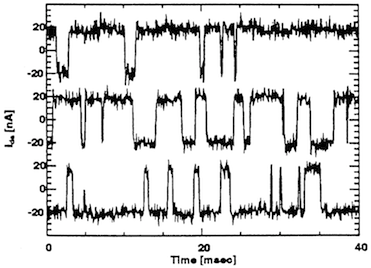Other Parts Discussed in Thread: ADS1282, OPA211-HT, OPA211
Hello,
I have two identical hardware boards, each with 3 ADS1282-HTs. From one of these ADCs on one board I am getting a bit toggling in the output data seemingly at random. I connected the input of this misbehaving ADS in parallel with the input of another ADS on the same board, with a 5K resistor across the inputs. They share the same voltage reference and are programmed with the same script. I connected a logic analyzer to the data output pins of both and recorded several seconds of data. When I imported and plotted the data I could see that one ADS exhibits this bit toggle and the other does not. Here's a plot of the output data:
My assumption at this point is that I have a bad part despite it being brand new. Replacing the parts will cause us quite a bit of delay. Is there any other explanation for my observation, or can you confirm this is a bad part? Thanks,



